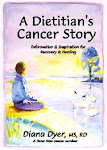Research being presented this week will support many previous studies that demonstrated women with breast cancer who are overweight or obese have increased risk of a recurrence and death from breast cancer. There are many unknowns regarding these observations, one of which has been if these women have been under-treated by chemotherapy dosing that was too low, because dosing was based on their 'ideal weight' versus their 'actual weight'.
The new study has eliminated that possibility from the mix of unknowns, showing that even overweight or obese women treated with chemotherapy based on actual weight (i.e. higher doses) had increased rates of recurrence and death from breast cancer compared to women of normal weight.
With ~2/3 of our population being overweight or obese plus being overweight or obese increasing the risk of post-menopausal breast cancer, it can be expected that at least 2/3 of women newly diagnosed with breast cancer will be faced with this situation. What to do about it is still unknown, a big unknown. However, no one should be waiting for more studies in order work up the courage to ask their oncologist at the cancer treatment facility for a referral to a Registered Dietitian (RD), ideally one with a specialty certification in oncology nutrition (CSO).
The absolute worse thing one can do is listen to people (including friends, family, strangers, or staff) who say 'just don't worry about it, eat anything you want during treatment and then try to lose weight after chemo, radiation, and/or surgery is done'. Why do I think that is not good advice or 'best practice'? This study did not track (or report in this press release) how many of these women with increased recurrence/death had gained weight during treatment, which is common and also tied to poorer outcomes.
The bottom line in my ideal world: ALL cancer patients, but especially those with breast cancer who are overweight or obese, should be referred to a Registered Dietitian who is on the staff at the cancer treatment facility to work together on strategies for weight maintenance during therapy and then weight reduction (slow and sure, no 'crash' diets) afterward.
Optimizing the odds for survival from all cancer diagnoses requires a full-court press from knowledgeable and experienced team members. An oncology team without an RD, particularly one with specialized knowledge in oncology, is a member short of that optimal full-team effort. I know these RDs with the CSO specialization. I helped create this specialty, and I know how rigorous the certification exam is! (I am sure I could not pass it without a major investment of study time.) To a one, these RDs with CSO after their name are very smart, compassionate, and committed to oncology patients. They will be 'your new best friend', and I would insist on having one on my team if I or a family member would be diagnosed with cancer in the future.
Please give yourself the best chance for recovery, and if necessary, take a deep breath and be the squeaky wheel at your cancer center, both for yourself and all those patients following you. :)
Cultivate your life - you are what you grow - inch by inch, row by row,
Diana Dyer, MS, RD
Addendum: 4/12/2012 - An article published today (full article available free of charge) reinforces what I have said in this blog post, that weight management needs to be included as a component of cancer management for all breast cancer patients at all stages of cancer treatment and survival, in order to optimize odds for cancer survival (even if a woman is at normal weight when diagnosed and also before all research is completed verifying that weight loss will improve odds) and perhaps even more importantly, to reduce risk of other common pre-existing or exacerbated co-morbid health conditions such as heart disease. (Weight management and its role in breast cancer rehabilitation, DeMark, W et al, Cancer Volume 118, Issue Supplement 8, pages 2277–2287, 15 April 2012)
Subscribe to:
Post Comments (Atom)


No comments:
Post a Comment